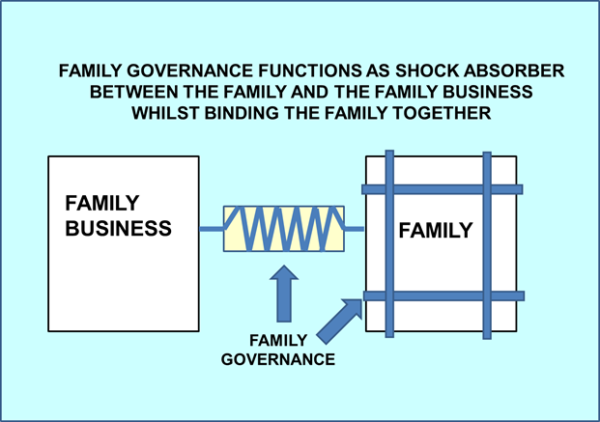What is Family Governance
The structure, policies and processes which are used to govern the interaction(s) of the family members with the family business in a fair and transparent way constitute the “Family Governance”.
Family Governance starts with a Family Constitution or Charter which articulates the family vision, mission, values and policies regulating the family members’ relationship with the business. And is implemented via institutions with different forms and specific roles which include
- The Family Assembly – sets the vision and approves major family related policies and procedures and elects the Family Council
- The Family Council – in effect the Board of the Family, manages the interaction of the family with the family business, resolves conflicts, develops major family related policies
- Family Committees with specific responsibilities (e.g. family office, education, preparation of next generation of business leaders)

Why does it matter ?
Family members play a range of roles in the governance of their business. As a result there are interactions between the business and the family and different family members at multiple levels. These interactions pose specific challenges and risks that need to be regulated in a transparent way. If these challenges and risks are not addressed, they can undermine the longevity of the family business. At its core, Family Governance, seeks to firstly promote family harmony and through the creation of a predictable and transparent framework governing the family’s interaction with the business, also promote and oversee the sustainable development of the family business.
Multi-generational family businesses with great longevity share certain attributes which suggest these characterize a well functioning family governance structure
- Communicating the family values, mission and long term vision to all the family members
- Keeping family members (especially those not active in the business) informed about major business successes, challenges and strategic direction
- Communicating the rules and decisions that might affect the family members’ employment, dividends and other benefits they usually get from the business
- Establishing formal communication channels that allow family members to share their ideas, aspirations and issues
- Allowing the family to come together and make any necessary decisions
Well functioning Family Governance helps built trust amongst family members (inside and outside the business) and unifies the family, thus improving the viability chances of the business.


How do you introduce Family Governance?
You start with the realization by a sufficient number of family members that the family business and the family itself can benefit from the introduction of Family Governance to complement the Corporate Governance that may have already been introduced at the business level. A small group of family members or an individual gets tasked with formulating ideas and presenting them to the wider family for adoption. External advisors can be helpful in identifying relevant best practices to be considered, particularly in relation to structures and policies, as the family considers what arrangements make sense for their own circumstances and their business. The introduction of Family Governance is a process through which the family reaches consensus on important matters which will have an impact on the current and if all goes well also future generations. It cannot be rushed or imposed but the fact it does take time, should no deter families from the undertaking. Given the need for consensus, founders of businesses, whilst they are still the main driver of the family business, are in a particularly strong position to introduce Family Governance in anticipation of welcoming second or third generation members into the family business. As the family tree expands into later generations, consensus building for the need of Family Governance and what it should be, may become more unwieldy. If the founder has not addressed Family Governance, then siblings are well advised to do so, preferably whilst the founder or founders can still provide input and guidance.

